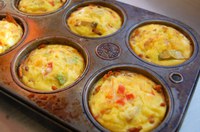Prairie Fare: Don’t Forget to Eat Breakfast
(Click an image below to view a high-resolution image that can be downloaded)
By Julie Garden-Robinson, Food and Nutrition Specialist
NDSU Extension
“When was the last time you had something to eat?” I ask my family, especially when someone is irritable.
When they can’t remember, then I know that nourishment is needed as soon as possible.
In my home, we have a tendency to get a bit terse and tense when we are in need of food, especially if breakfast was skipped.
I’m no exception.
“Mom, are you hungry?” I’ve been asked by my kids. “Eat something, please!”
Yes, skipping meals can induce crankiness among the Robinson family. I don’t think we are alone.
I have good reasons for having a basket of snacks on the counter at home and on my desk at work.
Maybe we are less of a nation of “breakfast skippers” than previously thought, according to a study published in January 2021 by the U.S. Department of Health and Human Services.
About 84% of adults ate breakfast on a given day, according to an analysis of data from 2015 to 2018. In fact, as people get older, they are more likely to eat breakfast.
About 77% of adults 20 to 39 ate breakfast. About 86% of adults ages 40 to 59 and nearly 92% of adults more than 60 years old ate breakfast.
What does eating breakfast do for us? It literally “breaks the fast” and refuels our bodies after sleep.
All food components (protein, fat, carbohydrate) are broken down to glucose at various rates. Our brain needs a constant supply of glucose to think and perform at work and school.
What you choose to eat for breakfast makes a difference. Eating a piece of frosted cake for breakfast is not your best option for sustained energy. You will have a burst of energy as your blood sugar spikes from the sugar, then it plummets, leaving you groggy.
Having eggs for breakfast helps sustain your energy level because of their excellent protein content. Eggs also provide choline, which is good for your brain health. Top your eggs with salsa and add whole-wheat toast, fresh fruit and milk for a complete meal.
Oatmeal is an excellent breakfast food. Oatmeal is a whole-grain food with plenty of fiber that helps you feel full. Add some berries to your oatmeal and milk or yogurt and you have a power-packed meal. Try “overnight oatmeal” as a breakfast meal.
If oatmeal is not your favorite, try another whole-grain cereal. Read and compare Nutrition Facts labels and aim for cereals lower in added sugars and higher in fiber.
Think about your typical breakfast. Do you have at least three of the five food groups represented? Try to vary your choices among the protein, fruit, vegetables, dairy and grains groups.
This tasty recipe includes vegetables, protein and dairy in one recipe when you have a little more time for food preparation. If you have kids in school, check out the school breakfast programs that may be available where you live.
See the NDSU Extension resources at https://www.ag.ndsu.edu/food and check out the publications under “Food Preparation” for more ideas.
Bacon and Avocado Hash Brown Egg Cups
2 1/2 c. hash browns, thawed
3 Tbsp. canola oil (or your favorite oil)
Salt and pepper, to taste
6 eggs
1/2 avocado, diced
1/2 c. shredded cheddar cheese
2 slices precooked bacon or turkey bacon, chopped (if desired)
1/2 bell pepper, diced
Preheat oven to 425 F. Spray a muffin tin with cooking spray and set aside. Pour hash browns into a large bowl. Add oil 1 tablespoon at a time, stirring in between, until the hash browns are just coated, not oily. Season with salt and pepper as desired. You will need tins with a total of 16 muffin cups to yield eight servings. Line each muffin cup with seasoned hash browns, pressing down to fit the bottom and sides of each cup, creating a crust. Place muffin tin in preheated oven and cook for about 20 minutes, or until hash browns are golden brown. Lower oven temperature to 325 F. Wisk eggs in a mixing bowl. Fold in avocado, cheese, precooked bacon and pepper. Scoop egg mixture into each hash brown crust and place back in oven. Bake for 15 to 20 minutes, or until eggs are set. Eggs should reach an internal temperature of 145 F. Let cool for a few minutes and serve.
Makes eight servings. Each serving has 160 calories, 12 grams (g) fat, 8 g protein, 6 g carbohydrate, 1 g fiber and 150 milligrams sodium.
(Julie Garden-Robinson, Ph.D., R.D., L.R.D., is a North Dakota State University Extension food and nutrition specialist and professor in the Department of Health, Nutrition and Exercise Sciences. Follow her on Twitter @jgardenrobinson)
NDSU Agriculture Communication
Source: Julie Garden-Robinson, 701-231-7187, julie.garden-robinson@ndsu.edu
Editor: Ellen Crawford, 701-231-5391, ellen.crawford@ndsu.edu




